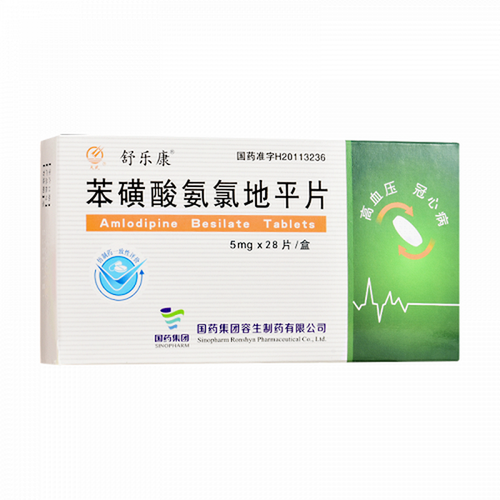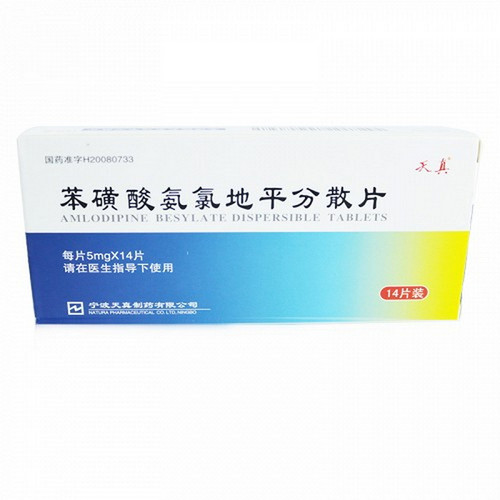Product Overview
[Drug name]
Generic name: Amlodipine besylate tablets
Trade name: Yilujing Amlodipine besylate tablets 5mg*14 tablets
Pinyin full code: YiLuJing BenHuangSuanAnLvDiPingPian 5mg*14Pian
[Main ingredients]
Amlodipine besylate.
[Properties]
This product is white or off-white tablets.
[Indications/main functions]
1. Hypertension This product is suitable for the treatment of hypertension. This product can be used alone or in combination with other antihypertensive drugs. The control of hypertension is part of the comprehensive management of cardiovascular risk. Comprehensive management measures may include: blood lipid control, diabetes management, antithrombotic treatment, smoking cessation, physical exercise and sodium salt intake restriction. Increases in systolic or diastolic blood pressure increase cardiovascular risk. At higher baseline blood pressure levels, the absolute risk increase brought about by an increase in blood pressure per millimeter of recording column will be higher. The relative degree of risk reduction achieved by lowering blood pressure is similar in people with different absolute cardiovascular risks. For patients with severe hypertension, a slight reduction in blood pressure can bring greater clinical benefits. For adult patients with hypertension, generally speaking, lowering blood pressure can reduce the risk of cardiovascular events, mainly stroke and myocardial infarction. 2. Coronary heart disease (CAD) Chronic stable angina This product is suitable for the symptomatic treatment of chronic stable angina. It can be used alone or in combination with other anti-anginal drugs. Vasospastic angina (Prinzmetal’s or variant angina) This product is suitable for the treatment of confirmed or suspected vasospastic angina. It can be used alone or in combination with other anti-anginal drugs. Coronary heart disease confirmed by angiography For patients with coronary heart disease confirmed by angiography, but with an ejection fraction ≥ 40% and no heart failure, this product can reduce the risk of hospitalization due to angina and reduce the risk of coronary artery reconstruction.
[Specification model]
5mg*14 tablets
[Usage and dosage]
Treatment of hypertension: The usual oral starting dose is 5mg, once a day, and the maximum dose does not exceed 10mg, once a day. Thin people, weak people, elderly patients or patients with impaired liver function should start taking the drug from 2.5 mg once a day; patients taking other antihypertensive drugs should also start taking the drug from this dose. The dosage of the drug is adjusted according to individual needs, and the adjustment period should be no less than 7-14 days so that the doctor can fully evaluate the patient's response to the dose. However, the adjustment speed can be accelerated under the premise of clinical guarantee. The recommended dose for the treatment of angina pectoris is 5-10 mg, and the elderly patients or patients with impaired liver function need to reduce the dose.
[Adverse Reactions]
Patients can tolerate this product well. The more common side effects are headache, edema, fatigue, insomnia, nausea, abdominal pain, flushing, palpitations and dizziness. The less common side effects are itching, rash, dyspnea, weakness, muscle cramps and indigestion. Similar to other calcium antagonists, there are very few reports of adverse reactions of myocardial infarction and chest pain, and these adverse reactions cannot be clearly distinguished from the patient's underlying diseases. No abnormal laboratory test parameters related to this product have been found.
[Contraindications]
Contraindicated for patients allergic to dihydropyridine calcium antagonists.
[Drug Interactions]
1. Cimetidine, grapefruit juice, acidogens: The pharmacokinetics of this product are not changed when used together. 2. Atorvastatin, digoxin, ethanol: This product does not affect their pharmacokinetics. 3. Sildenafil: A single dose of Sildenafil (Viagra?) in patients with primary hypertension has no effect on the pharmacokinetics of this product. The two drugs produce an independent antihypertensive effect when used together. 4. Warfarin: This product does not change the prothrombin action time of warfarin. 5. Digoxin, phenytoin and warfarin: The combination with this product has no effect on the plasma protein binding rate. 6. Anesthetics: Inhaled hydrocarbons combined with this product can cause hypotension. 7. Nonsteroidal anti-inflammatory drugs: Indomethacin in particular can weaken the antihypertensive effect of this product. 8. Hormones: Combined use can cause fluid retention and increase blood pressure. 9. Pyrrolidone: Co-administration may increase the protein binding rate of this product and cause changes in blood drug concentration. 10. Co-administration may cause neurotoxicity, nausea, vomiting, diarrhea, ataxia, tremor and/or numbness, so be cautious. 11. Sympathetic amines: may weaken the antihypertensive effect of this product.
[Precautions]
1. Warning: A very small number of patients, especially those with severe coronary artery obstructive disease, experience increased frequency, prolonged duration and/or aggravated severity of angina pectoris, or acute myocardial infarction when starting calcium antagonist treatment or increasing the dose. The mechanism of action is currently unclear. 2. Because the vasodilator effect of this product is gradually produced, acute hypotension after taking this product has rarely been reported. However, in patients with severe aortic stenosis, when 0354311 is used in combination with other peripheral vasodilators, attention should be paid. 3. Use in patients with heart failure: Calcium antagonists should be used with caution in patients with congestive heart failure. In a long-term, placebo-controlled study (PRAISE-2) of patients with non-ischemic heart failure (NYHA-IV grade), although the incidence of worsening heart failure was not significantly different from placebo, there was an increase in reports of pulmonary edema associated with amlodipine. 4. Use in patients with impaired liver function: Like all other calcium antagonists, the half-life of this product is prolonged when liver function is impaired. However, the corresponding recommended dose has not yet been determined, so this product should be used with caution. 5. Use in patients with renal failure: The change in blood concentration of amlodipine is not related to the degree of renal impairment. Therefore, a normal dose can be used. This product cannot be removed by dialysis.








